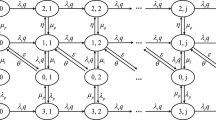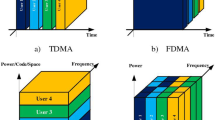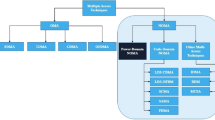Abstract
This paper proposes an exact and limit analysis framework for numerically assessing the outage performance of the maximum ratio combining in cooperative cognitive networks with proactive relay selection under channel information error on all channels simultaneously, maximum transmit power constraint, interference power constraint, and independent and non-identical fading channels. The proposed framework can be used for corresponding analysis in dual-hop cognitive networks with proactive relay selection to study how much performance gain can be achieved from utilizing the direct channel between the source and the destination in relaying communications. Various results demonstrate considerable system performance degradation and error floor phenomenon due to channel information error. However, performance degradation and error floor degree can be drastically mitigated by increasing the number of relays. Moreover, the direct channel significantly contributes to performance improvement at virtually no cost of system resources such as power and bandwidth.






Similar content being viewed by others
Notes
Recall that the influence of CIE on cognitive radio networks was investigated in different aspects; for instances, direct transmission (i.e., no relay) [4], dual-hop relaying with relay selection (e.g., [5]), the amplify-and-forward relay selection (e.g., [6]), relay non-selection (e.g., [7]). Furthermore, some relay selection standards (e.g., proactive relay selection in [8]; reactive relay selection in [9]; N th best-relay selection in [10]; maximum secrecy capacity based relay selection in [11]; the relay selection with the compromise between the gain for unlicensed users and the loss for licensed users in [12]; partial relay selection in [13]) in cognitive radio networks are proposed without investigating the influence of CIE. This paper concentrates on proactive relay selection in decode-and-forward cooperative cognitive networks with CIE on all channels concurrently. Therefore, the literature related to the above-mentioned aspects is not really relevant to this paper and hence, should not be further surveyed in details.
This means that \(\lambda _{tr}\)’s, \(\forall \{t,r\}\), are equal (e.g. [10]).
\(\mathcal {K}[j]\) denotes the j th element of the set \(\mathcal {K}\).
\(\left\{ {x,y,\ldots } \right\} \mathop \rightarrow \limits ^{{{\mathcal {P}}},{\mathcal {Q}} \rightarrow \infty } \left\{ {X,Y,\ldots } \right\} \) is the short-hand representation which denotes \(x\mathop \rightarrow \limits ^{{{\mathcal {P}}},{\mathcal {Q}} \rightarrow \infty } X,y\mathop \rightarrow \limits ^{{{\mathcal {P}}},{\mathcal {Q}} \rightarrow \infty } Y,\ldots \).
It is also noted that [21] proposed an outage analysis framework for dual-hop cognitive networks with proactive relay selection in the case of PCI. However, [21] assumed the statistical independence of terms in \(\Upsilon \). More specifically, [21] assumed that \(\min (\gamma _{sk},\gamma _{kd})\) is uncorrelated with \(\min (\gamma _{si},\gamma _{id})\), \(\forall (k,i)\). This assumption does not hold because both contain a common term \(x = {\left| {{{\hat{h}}_{sp}}} \right| ^2}\).
Adding more results of other combining techniques makes figures messy and unreadable.
Other figures are crowded with performance curves and hence, only Fig. 2 illustrates the performance of the SC for readability and illustration.
References
Goldsmith, A., Jafar, S. A., Maric, I., & Srinivasa, S. (2009). Breaking spectrum gridlock with cognitive radios: An information theoretic perspective. Proceedings of the IEEE, 97(5), 894–914.
Nosratinia, A., Hunter, T. E., & Hedayat, A. (2004). Cooperative communication in wireless networks. IEEE Communications Magazine, 42, 74–80.
Bletsas, A., Khisti, A., Reed, D. P., & Lippman, A. (2006). Simple cooperative diversity method based on network path selection. IEEE Journal on Selected Areas in Communications, 24(3), 659–672.
Suraweera, H. A., Smith, P. J., & Shafi, M. (2010). Capacity limits and performance analysis of cognitive radio with imperfect channel knowledge. IEEE Journal on Selected Areas in Communications, 59, 1811–1822.
Sun, H., & Pour, M. N. (2014). Decode-and-forward relay selection with imperfect CSI in cognitive relay networks. In Proceedings of the IEEE MILCOM (pp. 416–421), Baltimore, MD, 6–8 Oct. 2014.
Seyfi, M., Muhaidat, S., & Liang, J. (2013). Relay selection in cognitive radio networks with interference constraints. IET Communications, 7(10), 922–930.
Khuong, H. V., Sofotasios, P. C., & Freear, S. (2014). Underlay cooperative cognitive networks with imperfect Nakagami-m fading channel information and strict transmit power constraint: interference statistics and outage probability analysis. Journal of Communications and Networks, 16(1), 10–17.
Zhong, B., Zhang, Z., Chai, X., Pan, Z., Long, K., & Cao, H. (2015). Performance analysis for opportunistic full-duplex relay selection in underlay cognitive networks. IEEE Transactions on Vehicular Technology, 64(10), 4905–4910.
Liu, Y., Wang, L., Duy, T. T., Elkashlan, M., & Duong, T. Q. (2015). Relay selection for security enhancement in cognitive relay networks. IEEE Wireless Communications Letters, 4(1), 46–49.
Zhang, X., Yan, Z., Gao, Y., & Wang, W. (2013). On the study of outage performance for cognitive relay networks (CRN) with the Nth best-relay selection in Rayleigh-fading channels. IEEE Wireless Communications Letters, 2(1), 110–113.
Sakran, H., Shokair, M., Nasr, O., El-Rabaie, S., & El-Azm, A. A. (2012). Proposed relay selection scheme for physical layer security in cognitive radio networks. IET Communications, 6(16), 2676–2687.
Chang, C. W., Lin, P. H., & Su, S. L. (2011). A low-interference relay selection for decode-and-forward cooperative network in underlay cognitive radio. In Proceedings of the IEEE CROWNCOM (pp. 306–310), Osaka, 1–3 Jun. 2011.
Zhong, B., Zhang, Z., Zhang, X., Wang, J., & Long, K. (2013). Partial relay selection with fixed-gain relays and outdated CSI in underlay cognitive networks. IEEE Transactions on Vehicular Technology, 62(9), 4696–4701.
Ding, H., Ge, J., da Costa, D. B., & Jiang, Z. (2011). Asymptotic analysis of cooperative diversity systems with relay selection in a spectrum-sharing scenario. IEEE Transactions on Vehicular Technology, 60, 457–472.
Giang, N. H., Bao, V. N. Q., & Le, H. N. (2013). Cognitive underlay communications with imperfect CSI: Network design and performance analysis. In Proceedings of the IEEE ATC (pp. 18-22), HoChiMinh City, 15–17 Oct. 2013.
Thanh, T. L., Bao, V. N. Q., & An, B. (2013). On the performance of outage probability in underlay cognitive radio with imperfect CSI. In Proceedings of the IEEE ATC (pp. 125–130), HoChiMinh City, 15–17 Oct. 2013.
Wu, Q., Zhang, Z., & Wang, J. (2013). Outage analysis of cognitive relay networks with relay selection under imperfect CSI environment. IEEE Communications Letters, 17(7), 1297–1300.
Tang, X., Cai, Y., Yang, W., Yang, W., Zhang, T., & Chen, H. (2016). Outage analysis of buffer-aided underlay cognitive relay networks with outdated CSI. International Journal of Electronics and Communications, 70(3), 359–366.
Zhang, X., Xing, J., Yan, Z., Gao, Y., & Wang, W. (2013). Outage performance study of cognitive relay networks with imperfect channel knowledge. IEEE Communications Letters, 17(1), 27–30.
Tourki, K., Qaraqe, K. A., & Abdallah, M. (2014). Outage analysis of incremental opportunistic regenerative relaying with outdated CSI under spectrum sharing constraints. In Proceedings of the IEEE WCNC (pp. 851–856), Istanbul, 6–9 Apr. 2014.
Lee, J., Wang, H., Andrews, J. G., & Hong, D. (2011). Outage probability of cognitive relay networks with interference constraints. IEEE Transactions on Wireless Communications, 10(2), 390–395.
Vucetic, B., & Yuan, J. (2003). Space-time coding. Hoboken: Wiley.
Hanif, M., Yang, H. C., & Alouini, M. S. (2015). Receive antenna selection for underlay cognitive radio with instantaneous interference constraint. IEEE Signal Processing Letters, 22(6), 738–742.
Ahn, K. S., & Heath, R. W. (2009). Performance analysis of maximum ratio combining with imperfect channel estimation in the presence of cochannel interferences. IEEE Transactions on Wireless Communications, 8(3), 1080–1085.
Gradshteyn, I. S., & Ryzhik, I. M. (2000). Table of integrals, series and products (6th ed.). San Diego, CA: Academic.
Ahmed, N., Khojastepour, M., & Aazhang B. (2004). Outage minimization and optimal power control for the fading relay channel. In Proceedings of the IEEE ITW (pp. 458–462), San Antonio, TX.
Acknowledgments
This research is funded by Vietnam National Foundation for Science and Technology Development (NAFOSTED) under Grant No. 102.04-2014.42
Author information
Authors and Affiliations
Corresponding author
Rights and permissions
About this article
Cite this article
Ho-Van, K. On the performance of maximum ratio combining in cooperative cognitive networks with proactive relay selection under channel information errors. Telecommun Syst 65, 365–376 (2017). https://doi.org/10.1007/s11235-016-0238-3
Published:
Issue Date:
DOI: https://doi.org/10.1007/s11235-016-0238-3




